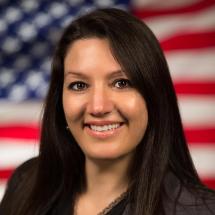Dr. Kristen Honey serves as Chief Data Officer (CDO) for the U.S. Department of Health and Human Services (HHS), supporting the HHS Office of the Chief Technology Officer (CTO).
Dr. Honey has 15 years of experience spearheading evidence-based policy, open data, open science, open innovation, emerging technologies, and public-private partnerships to advance mission. Prior to joining HHS in late 2018, Dr. Honey served in the White House Office of Science and Technology Policy (OSTP), leading the Open Data portfolio and advising the U.S. CTO from 2015–2017. She worked in the White House Office of Management and Budget (OMB), advising the Federal Chief Information Officer (CIO) from 2017–2018. During her three years in the White House, Dr. Honey collaboratively led “MyData”—personal data in a human-centric way, like Blue Button for health data. Her Open Data efforts across two administrations codified U.S. data “open by default” into federal law with the Foundations for Evidence-Based Policymaking Act (Evidence Act) of 2018. She built coalitions for digital solutions related to the PREVENTS suicide prevention, hurricane disaster response, disease outbreaks, biosecurity, and other White House priorities.
Given her expertise in complex, adaptive systems and passion for data, Dr. Honey thrives on “wicked problems” that demand interdisciplinary problem solving—including chronic, multi-systemic conditions like Lyme disease, Long COVID, Myalgic Encephalomyelitis/Chronic Fatigue Syndrome (MECFS), and “infection-associated chronic conditions and illnesses” (IACCIs). Such complex conditions are often invisible illnesses, lacking definitive diagnostics and surrounded by scientific uncertainties and controversies. Where controversy exists, Dr. Honey believes we need more data—open data. Then, follow the data wherever the data lead.
In 2020, during the COVID-19 response, Dr. Honey helped HHS to establish the Office of the CDO (OCDO) and served as Acting CDO and Executive Director of Data Operations. Now returning to a mature OCDO five years later, Dr. Honey infuses U.S. Open Data evangelism with her “people first, data always” ethos to leverage the power of data across all HHS divisions to guide Departmental decisions, inform actions, and deliver results with a bias for action. On the frontlines of the COVID-19 response for 18 months from the beginning of the pandemic through October 2021, Dr. Honey delivered large technical projects for HHS. She served on the digital “SWAT Team” in collaboration with the HHS CTO, CIO, Chief Information Security Officer (CISO), and HHS senior leadership to:
- Build HHS Protect for COVID-19 data sharing.
- Build “HHS Vision” with COVID-19 Artificial Intelligence (AI) ecosystem (sunset July 2021).
- Enhance HealthData.gov for HHS Open Data for the public.
Since joining HHS, Dr. Honey introduced the Department to The Opportunity Project (TOP) and TOPx tech sprints from the U.S. Census Bureau, using government open data to build digital tools with, by, and for the people. She envisioned and established the HHS InnovationX team, Health+™ (pronounced “health plus”) Human-Centered Design program, and public-private partnerships. Dr. Honey co-founded the $25M LymeX, Innovation Accelerator, CancerX with 200 external organizations, COVID-19 PandemicX Accelerator, and other cross-sector collaborations.
Dr. Honey earned her Ph.D. at Stanford University in the Emmett Interdisciplinary Program in Environment and Resources (E-IPER) with depth areas in biology and natural resource economics, plus a Ph.D. Minor in Civil and Environmental Engineering. Her doctoral research and academic efforts focused on marine fisheries, water management, and applying complex adaptive systems theory to improve data-limited management decisions. Dr. Honey holds an M.A. in Environmental Studies from the University of California, Santa Cruz, and a B.A. in Human Biology with Honors from Stanford University. Dr. Honey is a proud “Maineiac” originally from the public schools of Portland, Maine, and the small, “rebellious” town of Long Island in Casco Bay, Maine, that succeeded from the City of Portland for local, collective self-governance.
